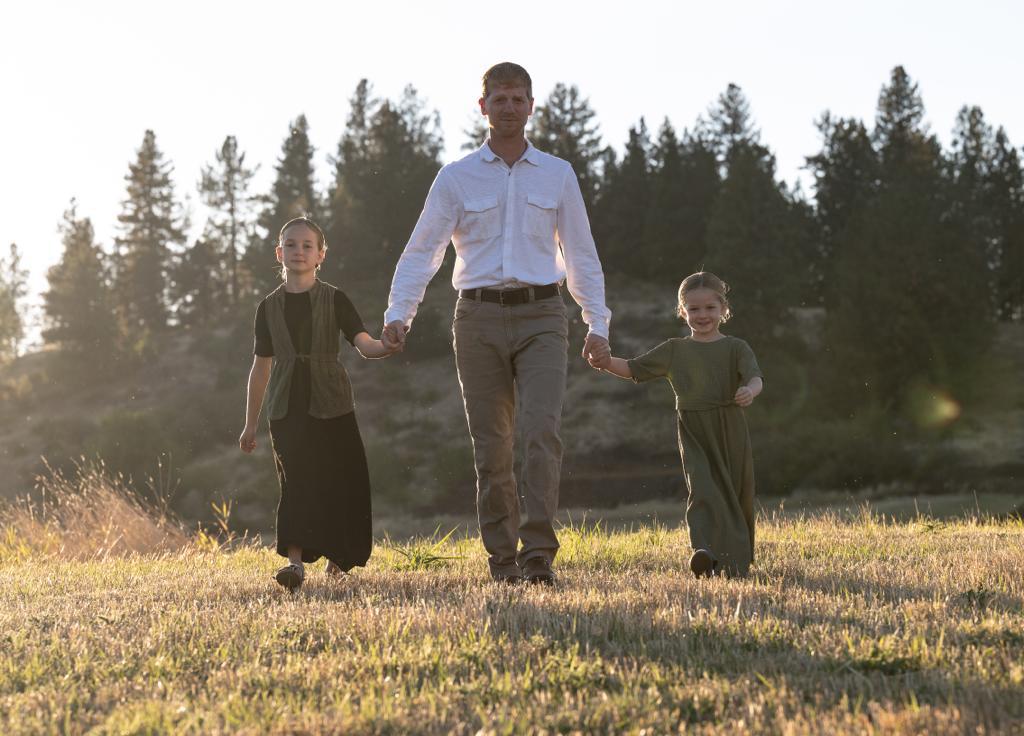Daughters

My wife has birthed me two daughters, one of which runs wild and half-clothed up trees and on roofs, eating radishes yanked from the earth, panting and swimming and chewing sticks and grass stems. The other will be found with adorable pink things, or bent over paper, drawing, folding, or taping gifts for others. One is dark, the other fair. They are beautiful girls, beautiful daughters for whom I’d walk through flames or high water. The ends of the earth would be a trivial destination on their behalf.
Yet life with my daughters rarely contains waters or flame. It is mostly a life of repetitive mundanity. Up in the morning, down in the evening, going places, doing things, eating, working, reading. But behind this life of seemingly meaningless repetition is a parallel reality. Here hearts are growing, ideas are forming. Questions are being asked and answered. While in one world we are getting dressed for church and talking of their new watches, in the other a woman is being formed. What is important to us as fathers? What matters to me? What developments should I prioritize in their 21st-century-Anabaptist world?
Our daughters should be good choosers
To be human is to choose. To love is to grant agency. To understand human choice is to have a taste of being God, for giving humanity freedom of choice cost a God a price we will never comprehend, and it frames our knowing of Him. He chooses me, I choose Him.
The submissive love Peter and Paul call wives to live has often been a rationale for volitionally underdeveloped conservative women, women who are expected to cultivate hesitancy and bewilderment in the face of complex decisions will devolve into giggling Susannas who simper and dither at their supplement bottles. Our daughters will not choose submissive, reverential love for their husbands if they have not been taught to choose. Submission is not the relinquishment of choice, but the fullest exercise of it.
Our daughters should be comfortable speaking to adults
Our daughters should be able, at a young age, to say both yes and no to big people. They should be able to look up at an adult and speak clearly, expecting to be seen and heard. Young daughters must know to say no to bad people who might try to touch them in the wrong ways. They need to say yes at the right times, to volunteer, to step up and speak up, raise their hands, answer questions. And when they’re 18 and 20 they may need to say no again, this time to the petulant, mouth-breathing child-man who sits too close, talks too soon of his money, and drives too much truck. The eye contact, the clear enunciation and supporting hand motions of good communication are easily learned by children with parents who model these skills and give them time and place to practice. Asking permission to borrow books, apologizing for wrecking a toy, ordering their own food at restaurants, explaining complex situations to Grandma—all these scenarios are invaluable for our daughter’s abilities to speak and communicate to adults in her world.
Our daughters must understand their effect on men
Throughout the course of humanity, men have seemed to successfully centralize and wield power. Any honest observer, though, will know there is much more to the story. Men may command thrones and countries, but those haunting whispers in the night, asking for validation, asking, “Who am I?” are often answered through the eyes of the women we love. Those candle-lit moments of intimacy where our women speak their minds can fracture and shift the bedrock of our souls.
Our daughters will slowly become aware of the effect of their presence on the men around them. If we have raised daughters with an acquired taste for male approval and a backlog of emotional needs, this realization will seem to be the means through which their needs will be met. We must talk early and honestly of their sexuality, their femininity, male psychology, and unregenerate humanity’s uses of these things. We must help them understand the dynamics that drive the physiology of the men around them and teach them the skills with which to navigate these worlds.
Our daughters must understand their value
Our daughters will develop in a world with pervasive value messaging. Not all will be negative, but the bulk of it, the pop-culture level of feminine values, will be driven by an exploitative, unregenerate male culture. If we are to successfully offer something better, we must be able to articulate it to our 12-year-old daughters. Do we have a vision of feminine beauty centered around the redemptive love of our Maker? Does “letting your light shine” have the meaning and substance to elevate their identity above the superficialities of both the secular and conservative Anabaptist short-sells? Above both cheap makeup and bared skin and dress pleats and sock colors? Do they know, without being told, how their value has nothing to do with the lucky 34-24-34 measurements most successful models share or with the approval of the men and girls they know?
Our daughters stand alone before God
There is neither Jew nor Gentile, neither slave nor free, nor is there male and female, for you are all one in Christ Jesus.
Being woman, to our daughters, must never equal a reduced spiritual expectation or an exemption from intellectual rigor or theological literacy. On that Great Day of our Lord, no man will say of any woman, “She’s with me”, and so affect a fly-over judgement. Each of us, man or woman, will answer for ourselves. When we parents ask different questions of our daughters than our sons, or ask the same questions differently, or assume a trailing comprehension, we ourselves do not yet love and understand them fully as the humans they are.
Your daughters bear the image of their Father. Raise them that way.